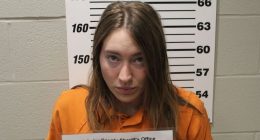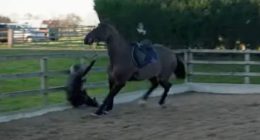You’re not tripping.
Psychedelics could remedy long COVID symptoms, some scientists are saying.
LSD (“acid”) and psilocybin, the psychoactive ingredient found in “magic mushrooms,” are the latest drugs to show promising results in COVID-19 patients with excruciating and persistent symptoms, according to a Time report.
Shortness of breath, fatigue, brain fog, sleeping problems and pain are just a few of the “debilitating” symptoms of long COVID that continue beyond detectable infection.
Psychedelics have recently been used in experimental treatments for mental health and addiction problems — but for some, psychoactive drugs have proven to alleviate more than a bout of depression.
“It’s a brand-new way of looking at a lot of different symptoms that people experience,” Dr. Joel Castellanos told Time. The associate medical director of the Psychedelics and Health Research Initiative at the University of California, San Diego said he’s “excited” about the potential of the psychoactive drug.
Castellanos regularly hears from patients who have experienced long COVID symptoms – headaches, mental health problems, brain fog, fatigue – and self-medicated with psychedelics. Now, he’s trying to publish a case study about the phenomenon.

The observations coincide with the burgeoning popularity of psychedelic drugs. Last year, an estimated 5.5 million people indulged in hallucinogenics, despite expert warnings against the unsupervised, recreational use of illicit drugs.
But for a daring few, consuming psychedelics has drastically improved their quality of life post-COVID-19 infection.
Ruth, 31, told Time that she was struggling with shortness of breath and fatigue as well as issues with her heart, cognition, motor functions and more. With the knowledge that psychedelics have therapeutic effects, she downed five grams of psilocybin mushrooms back in 2021 – and it changed her life.
By the next day, her heart rate was back to normal, she could breathe more easily and her brain fog began to dissipate. While she knows it’s “probably difficult for people to process or believe,” she credits the psilocybin for her renewed health, admitting “it really worked.”

Renée, 53, began to microdose LSD – taking enough to benefit from the psychoactive effects of the drug, but not enough to produce a high – after experiencing COVID symptoms.
Read Related Also: The First Amendment Is First for a Reason
“I started to feel connected to humanity again. I had emotions again. I had some joy again. I felt normal,” she told Time, adding that she still occasionally takes small doses of psilocybin to reap its soothing effects.
Psychedelics can seem like a miracle for those who see no relief from traditional prescriptions and treatment methods.
Psilocybin researcher Dr. Sue Sisley, of the Scottsdale Research Institute in Phoenix, has seen the good of psychedelics in her patients at a long COVID clinic. While “initially skeptical,” her interest was piqued when “none of the medications I was [prescribing] for them were helping substantially,” yet psychedelics were.

But before patients can trip on doc’s orders, clinical trials are necessary, and there is a limited availability of psychedelic-related studies with relation to the coronavirus. (Not to mention that “magic mushrooms” are still illegal in most states.)
A University of California, Davis study published in February found that the chemical compounds in psilocybin could promote “functional neuroplasticity” by activating the brain’s serotonin 2A receptors, which are vital for cognition.
There’s been a push for the legalization of psilocybin in multiple states, following Oregon’s suit. In 2020, the Pacific Northwest state became the first to legalize the psychedelic drug for personal use for people 21 and older, but only at “service centers” where they can be directed and supervised.
Bills were recently introduced in New York and New Jersey that would legalize multiple natural psychedelics, such as psilocybin, for people over the age of 21.
Meanwhile, New York University launched its own Center for Psychedelic Medicine, which has multiple studies on psilocybin in the works this year, although none of them seemingly related to long COVID.

To fill in research gaps, Sisley advised on an Arizona state legislature bill that would grant $30 million to researchers investigating the role of psilocybin in various conditions, including long COVID.
Dr. Saleen Subaiya, who is a researcher at the Columbia University Irving Medical Center, is starting her own experimentation with single-dose psychedelics in a small pilot trial that addresses long COVID. She told Time that she and her co-authors will be evaluating patients for two months to monitor their symptoms.
But the physician, who also experienced long COVID, warns users to proceed with caution due to a lack of information on the powerful drug.
“The safest way to engage with these substances right now would be in a trial,” Subaiya said. “We’re dealing with very powerful psychoactive medications. People need to proceed with immense amounts of caution.”







